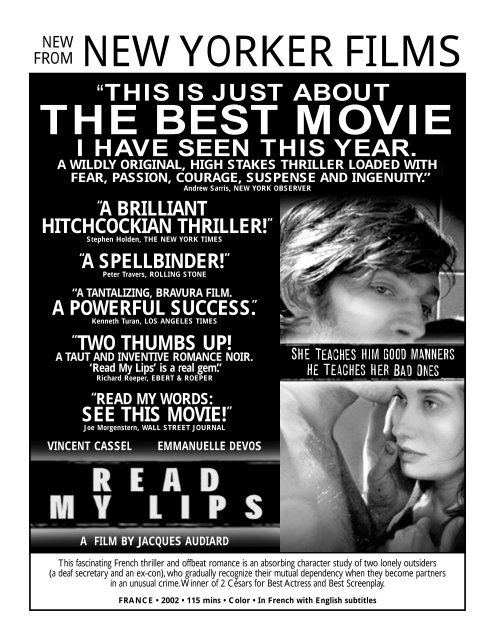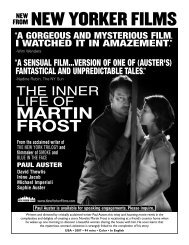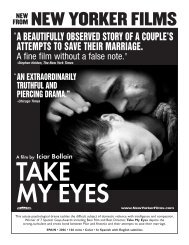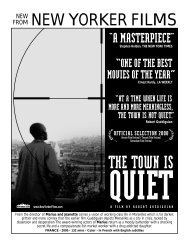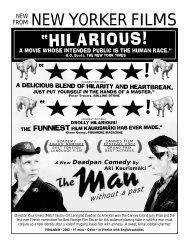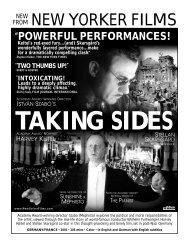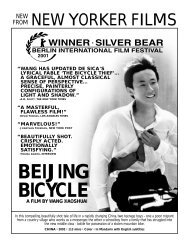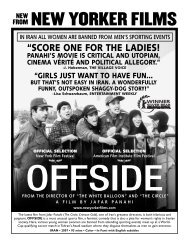READ MY LIPS.flyer - New Yorker Films
READ MY LIPS.flyer - New Yorker Films
READ MY LIPS.flyer - New Yorker Films
Create successful ePaper yourself
Turn your PDF publications into a flip-book with our unique Google optimized e-Paper software.
NEW<br />
NEW YORKER FILMS<br />
FROM<br />
“THIS IS JUST ABOUT“<br />
THE BEST MOVIE<br />
I HAVE SEEN THIS YEAR.<br />
A WILDLY ORIGINAL, HIGH STAKES THRILLER LOADED WITH<br />
”FEAR, PASSION, COURAGE, SUSPENSE AND INGENUITY.”<br />
Andrew Sarris, NEW YORK OBSERVER<br />
“<br />
A BRILLIANT “<br />
”<br />
HITCHCOCKIAN THRILLER! ”<br />
Stephen Holden, THE NEW YORK TIMES<br />
“<br />
A SPELLBINDER! ”<br />
Peter Travers, ROLLING STONE<br />
“A TANTALIZING, BRAVURA FILM.”<br />
A POWERFUL SUCCESS. ”<br />
Kenneth Turan, LOS ANGELES TIMES<br />
“<br />
TWO THUMBS UP! “<br />
A TAUT AND INVENTIVE ROMANCE NOIR.<br />
‘‘Read My Lips’ is a real gem.”<br />
Richard Roeper, EBERT & ROEPER<br />
“<strong>READ</strong> <strong>MY</strong> WORDS: “<br />
”<br />
SEE THIS MOVIE! ”<br />
Joe Morgenstern, WALL STREET JOURNAL<br />
VINCENT CASSEL<br />
EMMANUELLE DEVOS<br />
A FILM BY JACQUES AUDIARD<br />
This fascinating French thriller and offbeat romance is an absorbing character study of two lonely outsiders<br />
(a deaf secretary and an ex-con), who gradually recognize their mutual dependency when they become partners<br />
in an unusual crime.Winner of 2 Césars for Best Actress and Best Screenplay.<br />
FRANCE • 2002 • 115 mins • Color • In French with English subtitles
FILM REVIEW<br />
July 5, 2002<br />
If Work Doesn’t Pay, There’s Always Crime<br />
A.O. SCOTT<br />
Carla Bhem (Emmanuelle Devos), the heroine of Jacques<br />
Audiard's "Read My Lips," is, at least by French moviestar<br />
standards, plain and almost hyperbolically<br />
nondescript. Her stooped shoulders draped in a drab brown<br />
cardigan, she bustles mousily around the offices of a big<br />
construction firm, where she works as a receptionist. Her desk,<br />
shoved into a corner near the copy machine and the restrooms,<br />
is a convenient place for her co-workers to leave their halfempty<br />
coffee cups. Carla, who is partially deaf, is a person who<br />
exists to be taken advantage of and ignored. Even her best<br />
friend is mostly interested in exploiting Carla for free<br />
babysitting and the use of her apartment for adulterous liaisons.<br />
Mr. Audiard, who wrote the script with Tonino Benacquista,<br />
establishes the grind and slog of Carla's existence in a few swift,<br />
dexterous scenes. The sense of frustration we feel on her behalf<br />
prepares us to accept the crucial fact about her character that<br />
those around her miss altogether. Beneath her meek, humble<br />
facade is a quiet, volcanic fury, the flowering of which is among<br />
the film's many surprising satisfactions.<br />
Worrying that she might be overworked, Carla's boss allows<br />
her to take on a helper — a "secretarial assistant" in the words<br />
of an employment-agency bureaucrat — to handle some of the<br />
endless drudgery. She hires Paul Angeli (Vincent Cassel), a<br />
mopey ex-convict with no qualifications, who is unlikely to<br />
threaten her position, such as it is.<br />
The two are soon embroiled in a pyschological power<br />
struggle that threatens, oddly but convincingly, to turn into an<br />
office romance. Carla has at last found a Carla of her own,<br />
someone to pity and boss around. The various kindnesses she<br />
performs for Paul — she finds him a place to stay and covers for<br />
him when he misses an appointment with his parole officer —<br />
are also calculated ways of putting him in her debt.<br />
For his part, Paul assumes that her interest must be sexual,<br />
and he is not entirely wrong, even though she fights off his<br />
rough, clumsy advances. "You think you owe me," she says<br />
afterward, " and you pay me with what you have. But it's true.<br />
You do owe me." She is clearly intoxicated by his coarse<br />
masculinity. At one point, after Paul has been beaten by thugs<br />
from his past, she bundles herself, alone in her room, in his<br />
filthy, bloodstained shirt. But she also fantasizes about being<br />
the unattainable object of his desire, acting out imaginary<br />
conversations in which she sweetly plays hard to get. Her glee<br />
at discovering, at long last, a measure of power is accompanied<br />
by an increased vulnerability.<br />
Their differences of skill and temperament turn out to be<br />
complementary. Paul's knack for robbery helps Carla take<br />
revenge on an especially piggish co-worker, and her lip-reading<br />
ability, along with her organizational talents, make her a<br />
valuable partner in crime. Each is using the other, which turns<br />
out to be a better basis for intimacy and solidarity than the harsh<br />
politesse of the office.<br />
In its second half, "Read My Lips," which opens today in<br />
Manhattan, mutates almost casually from a workplace comedy<br />
into a violent, clammy caper film. Paul, like most movie<br />
criminals, has trouble leaving the thug life behind and finds<br />
himself indentured to a brutish nightclub owner named<br />
Marchand (Olivier Gourmet). There is a big bag of money to be<br />
heisted, as well as some nasty characters to contend with, and<br />
the psychological nuance gives way to the more conventional<br />
machinery of suspense.<br />
Throughout, Mr. Audiard's direction is fluid and quick. He<br />
uses sound editing and fast changes of perspective to mirror the<br />
effects of Carla's disability. Some noises are all but inaudible,<br />
while others are jarringly amplified (especially when she turns<br />
up her hearing aids), and the camera movements suggest that<br />
Carla has compensated for her hearing loss by developing a<br />
keen visual sense. She can read not only lips, but also the<br />
information embedded in posture, eye movements and body<br />
language.<br />
Like so many European pictures these days, "Read My Lips"<br />
seems destined to be remade in Hollywood, and it is unlikely to<br />
be improved by the addition of vainer actors, a simpler<br />
screenplay and flashier direction. Its ingenuity will not be hard<br />
to replicate, but its gritty immersion in the petty indignities of<br />
working life — something of a French specialty in recent years<br />
— is unlikely to survive. It is this quality that gets under your<br />
skin and turns its two beleaguered losers into genuine outlaw<br />
heroes.<br />
<strong>READ</strong> <strong>MY</strong> <strong>LIPS</strong><br />
Directed by Jacques Audiard; written (in French, with English<br />
subtitles) by Mr. Audiard and Tonino Benacquista; director of<br />
photography, Matthieu Vadepied; edited by Juliette Welfing; music by<br />
Alexandre Desplat; produced by Jean-Louis Livi and Phillippe<br />
Carcassonne. Running time: 115 minutes. This film is not rated.<br />
WITH: Vincent Cassel (Paul Angeli), Emmanuelle Devos (Carla<br />
Bhem), Olivier Gourmet (Marchand), Olivier Perrier (Masson), Olivia<br />
Bonamy (Annie) and Bernard Alane (Morel).<br />
Available in 35mm and VHS public performance to universities, museums & other non-theatrical customers (all dates subject to theatrical approval)<br />
CALL NEW YORKER FILMS TOLL FREE: 1-877-247-6200<br />
85 Fifth Avenue, 11th floor, <strong>New</strong> York, NY 10003 • Tel: (212) 645-4600 • Fax: (212) 645-3232 • nontheatrical@newyorkerfilms.com


